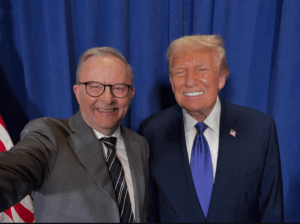Everybody knows the Albanese government has it easy in Parliament.
It has a big majority in the lower house, an easy Senate and an opposition in a shambles.
Less widely remarked is that, outside of Parliament, some key potential critics are also at a low ebb, and it’s not just the traditional media critics that are no longer able to influence elections.
The mining and gas lobbies are also historically weak.
This might not seem obvious, given the Albanese government’s tendency to do whatever the resource sector asks – whether it’s approving carbon-bomb gas export projects for Woodside, putting environment law reform on the go-slow for the mining industry, or doing as little as possible to end the “great gas giveaway”.
But the government’s subservience to the resource lobbies stems more from the personal preferences of Anthony Albanese and his ministers, rather than the power of the lobbies themselves.
Long-gone are the days of 2010 when, the mining industry could claim – apocryphally or otherwise – to topple prime ministers and governments. These days it can hardly organise a meeting in a conference centre.
Last week the Minerals Council of Australia and the gas lobby Australian Energy Producers hosted Australia’s first Energy and Minerals Tax Conference.
Two of the country’s most powerful industry groups were teaming up to “highlight the significant economic and tax contribution of the natural gas and mineral resources sectors”.
Why did they need to have three-day conference with government, opposition and media invited to talk about how much tax they pay?
Because the public has wised up to how little tax they pay and the generous subsidies they receive.
Polls show that Australians want the resource sector, and gas in particular, to pay more tax.
Voters are starting to realise that Australia’s nurses pay more tax than the gas industry. So do teachers.
Tax from mining companies makes up just 3 cents in the dollar of public revenue. Fossil fuel subsidies reached $15 billion this year, more than is spent on the Army or the Air Force.
So what happened at the Energy and Minerals Tax Conference?
We don’t know because, at time of writing, it has received precisely zero media coverage.
There was no media interest because there were no big names there. The keynote address was delivered by … drumroll … Bill Evans. It wasn’t even the famous Bill Evans.
In 2010, a conference like this would have attracted the PM and the opposition leader.
But in 2025, the Prime Minister did not go. Neither did the Deputy PM, the Treasurer, or even the Resources Minister. They didn’t want to go because they don’t want to be seen saying “gas companies not paying tax is just fine”.
Instead, this unwanted task was left to Assistant Minister Andrew Leigh, whose 2500-word speech did not include the words “gas” or “tax”. That’s right, at a gas industry tax conference, the government’s representative did not use the words “gas” or “tax”.
The opposition didn’t do any better, sending the shadow minister for trade, investment and tourism. I bet you can’t name him.
The Minerals Council’s conference was such a fizzer that the CEO of the Minerals Council did not speak at her own conference and sent her deputy instead.
To sum up, the two most powerful lobby groups in Australia had a party and nobody turned up.
This is not the only demonstration of the mining and gas sectors’ weakness.
Look at what happened when the Queensland government under Labor’s Stephen Miles changed the state’s coal royalty system to raise billions in extra public revenue.
The coal industry screamed blue murder, claiming Queensland would “rue the day” the mining industry was crossed.
Three years later, the royalty system remains and the new-ish LNP government has no plans to switch back. NSW followed in 2024 with coal royalty increases of its own, prompting barely a peep from the NSW Minerals Council.
The gas industry knows it is in a similar position. At the federal election, everyone from Peter Dutton to the ACTU agreed that unrestricted gas exports have become a national problem. The gas industry is in damage control.
This is, to put it mildly, an opportunity.
Now is the time to restrict gas exports.
Now is the time for strong environmental laws that will stop new gas and coal mines.
Now is the time to fix tax and royalty systems to ensure that Australians benefit from the sale of their resources.
We just need a government with the numbers and the courage.
Between the Lines Newsletter
The biggest stories and the best analysis from the team at the Australia Institute, delivered to your inbox every fortnight.
You might also like
Why a fossil fuel-free COP could put Australia’s bid over the edge
When the medical world hosts a conference on quitting smoking, they don’t invite Phillip Morris, or British American Tobacco along to help “be part of the solution”.
Can Albanese claim ‘success’ with Trump? Beyond the banter, the vague commitments should be viewed with scepticism
By all the usual diplomatic measures, Australian Prime Minister Anthony Albanese’s meeting with US President Donald Trump was a great success. “Success” in a meeting with Trump is to avoid the ritual humiliation the president sometimes likes to inflict on his interlocutors. In that sense, Albanese and his team pulled off an impressive diplomatic feat. While there was one awkward
Second-term Albanese Government can escape the Liberal veto
While the exact numbers are not settled, what is clear is that the Albanese Labor Government has won a decisive majority in the Parliament.



